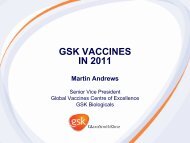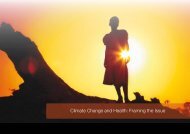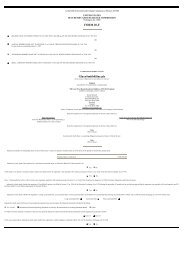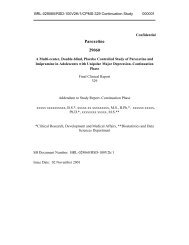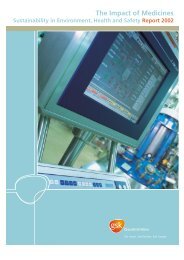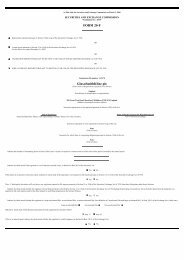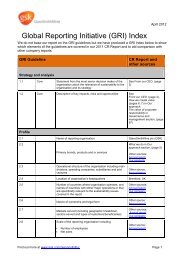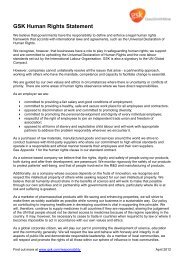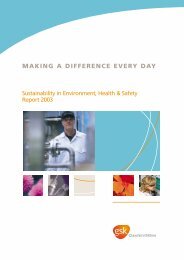GSK Annual Report 2002
GSK Annual Report 2002
GSK Annual Report 2002
Create successful ePaper yourself
Turn your PDF publications into a flip-book with our unique Google optimized e-Paper software.
GlaxoSmithKline gave unrestricted gifts of $10 million to the<br />
University of Pennsylvania and $5 million to Duke University. The<br />
gifts will be used to support their discovery research efforts to<br />
identify and develop new treatments for disease.<br />
Science in the Summer is a library-based science education<br />
programme in the Philadelphia area offering hands-on courses<br />
taught by certified teachers. A GlaxoSmithKline grant of $400,000<br />
to the American Association for the Advancement of Science<br />
supports this programme.<br />
In North Carolina, Duke University Medical Center received a<br />
$250,000 grant over two years to expand their adult diabetes<br />
education programme’s outreach to minority and underserved<br />
populations.<br />
With a $250,000 contribution over five years, the Rescue Missions<br />
Ministry will set up a GlaxoSmithKline educational scholarship<br />
endowment for formerly homeless people.<br />
The University of North Carolina at Chapel Hill received $250,000<br />
as part of an overall $1.25 million grant for a travelling science and<br />
technology bus to help improve science teaching and to encourage<br />
and advance the science careers of underserved and ethnic<br />
minority students.<br />
International<br />
GlaxoSmithKline’s International Community Partnerships<br />
programmes addressed health education and mobilisation,<br />
providing partnership funding of £1.1 million in <strong>2002</strong>. Programmes<br />
included:<br />
£320,000 to support its PHASE initiative (Personal Hygiene<br />
And Sanitation Education) in Kenya, Uganda, Nicaragua and<br />
Peru. PHASE targets school children and aims to reduce<br />
diarrhoea-related disease and death.<br />
£100,000 as part of a three-year commitment to fund an<br />
HIV/AIDS clinic in the Masoyi tribal area of Mpumalanga,<br />
South Africa.<br />
The Group extended its Rural Nursing Excellence programme in<br />
Thailand, which sponsors female high school graduates from rural<br />
areas to complete four-year nursing degrees. GlaxoSmithKline has<br />
donated another £100,000 to train a further 50 nurses.<br />
In Ethiopia GlaxoSmithKline provided £100,000 for the Integrated<br />
Management of Childhood Illnesses (IMCI) in partnership with the<br />
WHO and UNICEF. The goal is to contribute to the global reduction<br />
of mortality and morbidity in children under the age of five from<br />
pneumonia, diarrhoea, malaria, measles and malnutrition.<br />
In China, £100,000 of GlaxoSmithKline funding is supporting the<br />
development of a community-based HIV/AIDS programme in<br />
collaboration with the Red Cross Movement in China, British Red<br />
Cross and Australian Red Cross.<br />
Description of business GlaxoSmithKline 29<br />
Product donations<br />
GlaxoSmithKline donates essential products for humanitarian relief<br />
efforts. Donations are made at the request of governments and<br />
major charitable organisations and are generally manufactured<br />
specifically to meet these requests. NGOs complete a needs<br />
assessment and then order the product needed in their<br />
international communities. This ensures that the right product<br />
reaches the right person at the right time.<br />
In <strong>2002</strong>, the total value of the Group’s international product<br />
donations, excluding the lymphatic filariasis programme, was<br />
$23.4 million, at wholesale acquisition cost. This is<br />
GlaxoSmithKline’s wholesale list price, not including discounts and<br />
is a standard industry method of valuing product donations.<br />
Employee involvement<br />
GlaxoSmithKline employees are encouraged to contribute to their<br />
local communities through employee volunteering schemes.<br />
Support for this varies around the world but includes employee<br />
time, donations to charities where employees have completed<br />
voluntary work and a matching gifts programme. In <strong>2002</strong>, in the<br />
USA, the Group matched more than 9,000 employee gifts, at a<br />
value of $3.1 million.<br />
GlaxoSmithKline also matched contributions by employees to the<br />
United Way campaigns at a value of $1.6 million. This was further<br />
supplemented by GlaxoSmithKline’s three year grant of $555,000<br />
to the United Way of Southeastern Pennsylvania which provides<br />
specific capacity building grants and creates more effective<br />
healthcare delivery at the United Way’s 91 member agencies.<br />
GlaxoSmithKline’s Investment in Volunteer Excellence (GIVE)<br />
provided $500 grants to qualifying US non-profit organisations<br />
based on employee or partner volunteer time. The GIVE grants<br />
totalled $145,000 and reflect over 34,000 employee volunteer<br />
hours.<br />
Foundations<br />
The Group does not operate a single charitable foundation for its<br />
corporate programmes but has a number of country-based<br />
foundations including:<br />
The GlaxoSmithKline France Foundation supports programmes to<br />
improve HIV/AIDS prevention education, training and care,<br />
primarily in Africa. As a result, over 200,000 people are expected<br />
to access care and support services by the end of 2005.<br />
The North Carolina GlaxoSmithKline Foundation is an endowed,<br />
self-funding organisation which operates as a separate entity. The<br />
foundation publishes its own annual report, which is available on<br />
request, and uses its asset base to support math, science and<br />
health education in North Carolina. In <strong>2002</strong>, this foundation made<br />
donations totalling $2.2 million. This figure is not included in the<br />
Group’s total community investment figure.



